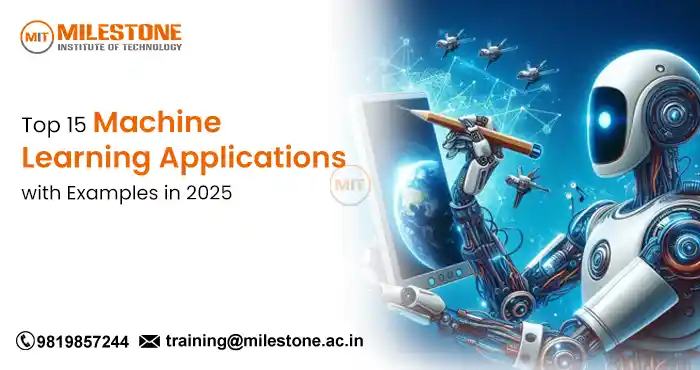Introduction
Machine learning is arguably one of today’s most powerful technologies, and it will only get more powerful heading into 2025. From detecting diseases to helping cars drive themselves, machine learning applications are already in use in many aspects of our daily lives and work-and there’s tremendous growth potential. Such systems learn, refine themselves or make decisions by going over data they receive a so-called model that has proved useful in hundreds of applications, from beating humans at games like chess and Go, to detecting software bugs or generating news articles, even deep-fakes. This transformation is also having effect in various industries like banking, education, healthcare and transportation.
In this blog, we will look into the top 15 Machine Learning Applications in 2025 with the real-life examples. Every application demonstrates how real-life machine learning can be used smartly in daily life and how we are able to build efficient solutions using these techniques.
-
Healthcare – Disease Detection and Diagnosis
Healthcare is one of the most critical sectors where Machine Learning Applications are literally transforming the future. ML algorithms assist physicians in diagnosing diseases faster and with higher accuracy. By sifting through vast storehouses of medical data, including patient records, lab results and images, machine learning can uncover patterns that a human doctor would miss. It can identify early warning signs of cancer in X-rays and MRIs. In 2025, hospitals are employing A.I.-driven tools to foretell diseases like heart attacks, diabetes and even Alzheimer’s before symptoms have shown. This results in earlier treatment and better patient outcomes.
-
Finance – Fraud Detection and Risk Management
Banks and financial services firms deploy machine learning to keep your money safe. Millions of transactions occur every day around the world. There’s no way for humans to check them all. Now here is where Machine Learning Applications come into play – ML models can learn from previous transactions and notice suspicious pattern that might indicate fraudulent behaviour. For instance, if your card is used on the other side of the world just minutes after it was used in your home town, the system has the ability to block payment and tell you. Companies like PayPal and Visa utilize ML to block fraud in real-time and even take credit risks by considering your financial history.
-
Retail – Personalized Shopping Experiences
Machine learning has changed online shopping forever. When you are in Amazon or Netflix and you look at recommendation, you see those that are super accurate. They are so statistical because they learn from your past purchases, searches, clicks items, browsing history to recommend product/movies/content that you might like. It’s 2025 and the E-commerce platforms heavily depend on Machine Learning Applications to give every single user a personalized experience. This is not only good for the end user, but also for growing sales and maintaining high user engagement.
-
Self-Driving Cars – Autonomous Navigation
Self-driving cars are one of the most exciting Machine Learning Applications in the modern world. These vehicles use sensors, cameras and machine learning models to perceive their environment and make decisions in the same way a human driver would. ML is also being used by Tesla, Waymo and others to train their cars to identify traffic lights, pedestrians, road signs and other vehicles. By 2025, use of autonomous vehicles for delivery services, public transportation and personal travel in most cities has become widespread, which has made roads safer and decreased the number of crashes due to human error.
Education – Adaptive Learning Platforms
Machine learning is also revolutionizing education by making it more personal and efficient. Adaptive learning platforms observe how students learn and where they stumble. Using this information, the system personalized the content that is the most applicable to the student’s level and learning approach. For instance, if a student struggles in math, the system will provide more practice questions and video tutorials in math. That allows students to learn at their own pace. Online platforms like Khan Academy and Coursera leverage Machine Learning Applications to provide personalized education for millions of learners worldwide.
-
Cybersecurity – Threat Detection and Prevention
Conventional security solutions are no longer able to defend against increasingly sophisticated cyber threats. Machine Learning applications are paramount in cybersecurity today, with progressive attributes compared to traditional techniques. Machine learning (ML)-enabled operations can analyze network traffic and user behavior in real time for the possibility of threats. For example, a machine learning model may be able to detect an attack from a hacker in a company’s system and prevent it. Now fast-forward to 2025, and companies now have widely adopted AI and machine learning applications and technology tools to defend data and stop cyber criminals and malware from causing harm.
-
Agriculture – Smart Farming and Yield Prediction
Agriculture might seem far from technology, but it is inevitably one of the fields which is being benefitted most with Machine Learning Applications. Farmers now rely on drones, sensors and machine learning to track the health of crops, forecast harvest times and manage irrigation. By combing through weather data, soil examinations and plants looking ill or thriving, ML models can tell you how to best plant your crops, and when you should be harvesting them. That helps farmers produce more food while consuming less. Leading the growth on the smart farm are companies like John Deere.
-
Customer Service – AI Chatbots and Assistants
We’ve all had conversations with customer support bots that pop up on websites. These chatbots utilize machine learning and natural language processing (NLP). They can answer routine questions, troubleshoot orders, and even take orders. As they engage more with users, they get smarter. It’s 2025, and most companies are deploying AI chatbots to ensure round-the-clock support, reduce wait times, and increase customer satisfaction. This includes chatbots on websites, within banking apps, and in some healthcare systems.
-
Language Translation – Real-Time Communication
Because of ML, traveling and speaking multiple languages is easier than ever. Apps like Google Translate are using machine learning to interpret text, speech and photos in real time. Recent neural machine translation models have produced accurate translations that are fluent and make sense. The year 2025; Travelers, the youth and professionals have Machine Learning Applications that break down the language barriers and the world’s communication is simply easier.
-
Manufacturing – Predictive Maintenance
Factories and industries need to maintain good working condition of machineries, in order to prevent costly breakdowns. Predictive maintenance applies ML to monitor the health of machines and predict when they might fail. Sensors gather data about things such as temperature, pressure and vibration and machine learning models use this data to look for early warning signs. Companies such as Siemens and GE utilize ML to avoid unexpected downtime, cut repair costs and extend the life of machinery.
-
Entertainment – Personalized Content Recommendations
Entertainment platforms apply machine learning to analyze what you like to watch or listen to. Machine learning follows your behavior on movies, music and game-related sites, and suggests similar content. Netflix, Spotify, YouTube and many others put powerful ML models to work to keep you entertained. Here are some of these Machine Learning Applications that make sure you always have something fun to watch or listen and enhance user engagement and satisfaction.
-
Recruitment – Smart Hiring Systems
The process of hiring the best candidate for a job is often long and frustrating. Machine learning helps it out by parsing resumes, comparing them with a mix of skills and figuring out how likely the candidate is to be any good at the job. Platforms such as LinkedIn employ ML algorithms to pair job seekers and recruiters. It’s 2025 and companies use AI tools to accelerate hiring processes, minimize bias and find the most qualified talent as quickly as possible.
-
Smart Homes – Automated Living
Artificial intelligence in smart home devices like thermostats, lights and voice assistants learn your preferences and habits. For instance your smart thermostat might learn when you get home from the office, then automatically change the temperature. The smart homes in 2025 are smarter as ever, providing comfort, energy saving and security at the right time using Machine Learning Applications.
-
Real Estate – Property Price Prediction
Real estate apps regularly use ML algorithms when calculating costs of real estate based on location, market situation, and neighborhood. Services such as Zillow utilize these sophisticated machine learning applications to assist buyers and sellers in making more informed decisions. Leveraging big data to consider millions of home price points and utilizing the total value of homes in proximity to listings, these apps give home buyers a competitive edge when shopping with valuable tools that will help them to snag the crème de la crème of home deals, as well as 2025 price predictions.
-
Transportation – Route Optimization and Traffic Prediction
Uber and other ride-sharing apps, for instance, and navigation services such as Google Maps all use machine learning to forecast traffic patterns and suggest optimal travel routes and precise arrival times. By continuously learning from the real-time data, these applications minimize drivers time and maximize users comfort. Machine learning applications are also becoming increasingly easier to use and intuitive. By 2025 they will be the heart of traffic-management systems in smart cities, helping shave minutes off the commutes of millions and making city transport more efficient than ever.
Conclusion
Machine learning is everywhere in 2025, from phones and homes to hospitals and factories. So this are the machine learning applications that are changing our way of living, improving it and helping us make better decisions and faster decisions, the kind of decisions that can save the world, or make our daily life better.
As the technology develop there are expected to be advanced machine learning applications in future, the room for advancing innovation can be almost inexhaustible. So whether you are an entrepreneur, student, or tech enthusiast, it is beneficial for you to know the real time use cases of ML for you to get ahead in this digital era.




